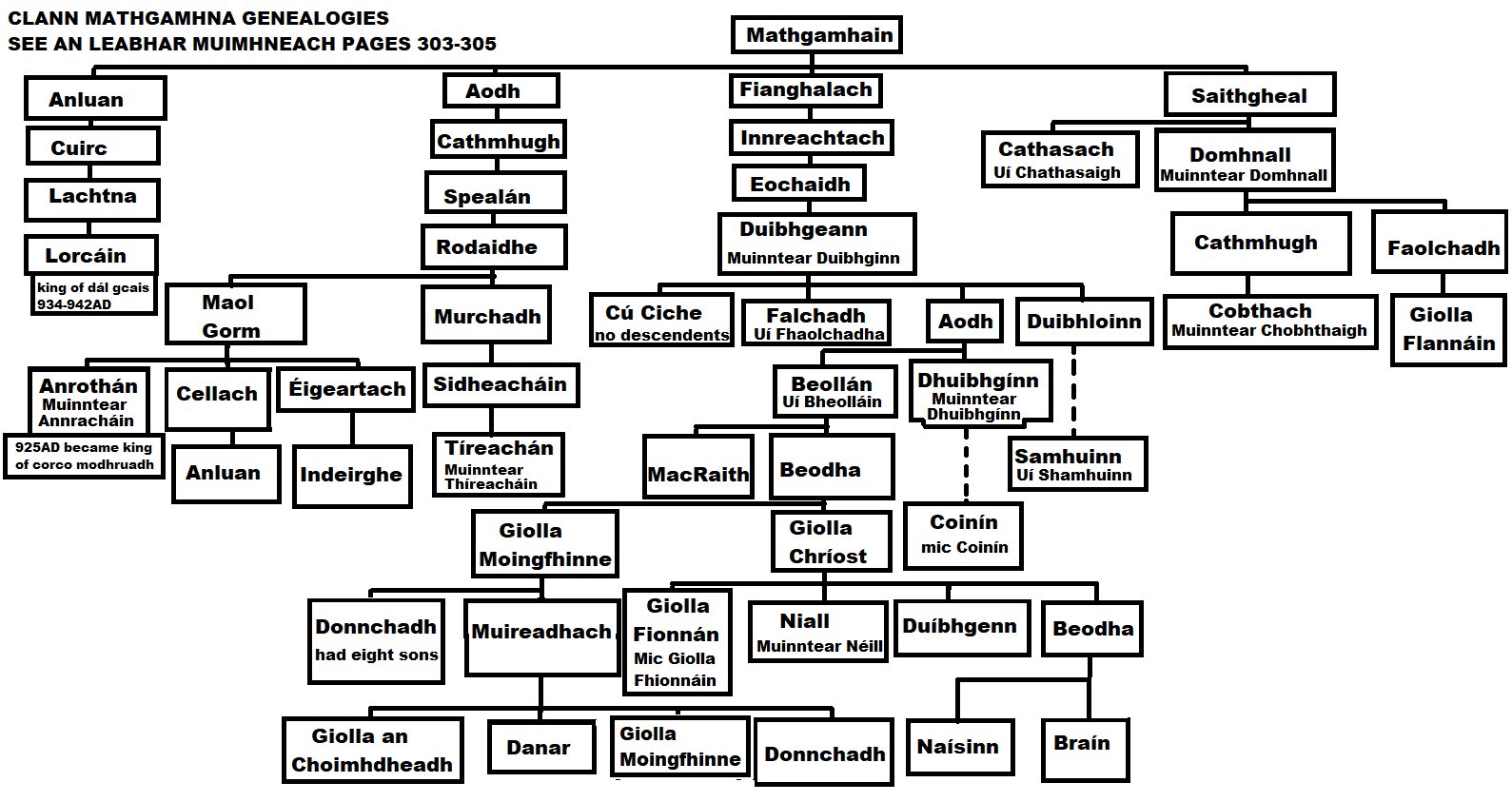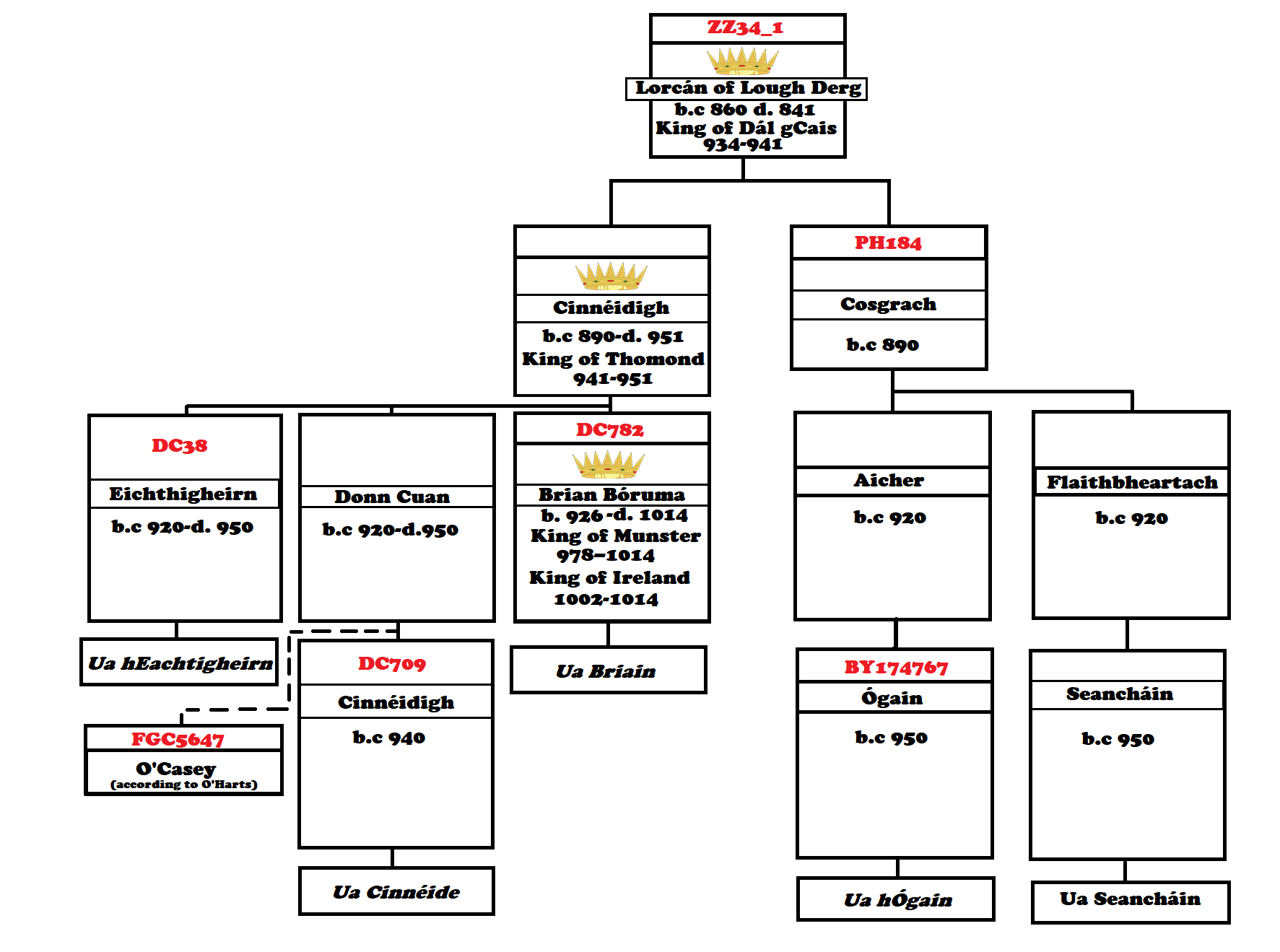Maithgamhain Mór (b.c 650)
Son of
Toirdhealbhach na dTreabha.
A poem (similar poem page 298 ALM) :The four sons of Mathgamhan the GreatWere venomously strong in battle.Saitheal the Gentle—our verse certifies itAedh of the Marsh, and Anluan (20).
(Twigge)
Had issue (
ALM page 298):* Anluan* Aedh of the marsh* Saithgheal caemh (the gentle)* Fianghalach

Anluan (b.c 700)
had one son: Cuircc
Cuircc na gcrech (of cattle-raids) (b.c 750)
(nickname from page 330 ALM) Was said to be the first of the Dál gCais to have routed the foreigners, winning eight battles in defence of Munster. (
Cogadh Gaedhel re Gallaibh) (
Westropp) had one son: Lachtna
Lachtna léidmheach (The Bold) (b.c 800)
(nickname from page 330 ALM) Do not interpret these stories as overly historical, we have no particular reason to believe the status of Lachtna in the mid 9th century was as they suggest, he isn't included in the Dál gCais king list, and only had one known son. These stories may be propaganda.
Stories about Lachtna
In the year 847, a chief named Lachtna ruled over Thomond (?), and an individual called Flan was at the time king and also abbot and bishop of South Munster.* Unmindful of the fact that the Dalcais were exempt from paying tribute either to the monarch of Ireland or to Munster, Flan nevertheless demanded payment and submission from Lachtna, which was refused, whereupon Phelim marched an army against Thomond and encamped on the eastern bank of the Shannon. Lachtna desired peace and assembled his chiefs, including Maolchuite, who at that period was the head of Clancuilein; they determined to resist the demand for tribute, and against the advice of their king wished to resort to arms in defence of their rights. Thereupon, Lachtna disguised him- self and proceeding to Flan's camp he obtained an audience with the King of Munster, and came to an amicable agreement with him ; the chief of Thomond then returned home; but in the meantime Phelim's mind had been poisoned by a sage he had consulted on the subject of the negotiations which he had been engaged in, and having been persuaded to distrust Lachtna he sent off a messenger in hot haste to recall that chief to his camp. On receiving this message Lachtna at once retraced his steps, ''and when Flan saw his good faith he felt full confidence in the chief of Thomond, and as a token of regard gave him his own steed and robes." Flan, we are told, also gave his blessing to Lachtna, which, as Mr. T. J. Westropp observes, could hardly have been accounted of much importance, as this king and bishop had just previously attacked and robbed the churches of Clon- macnoise, Armagh, Durrow, and Kildare,t and put their clergy to the sword. (
The story of an Irish sept : their character & struggle to maintain their lands in Clare, page 72) had one son: Lorcán
Lorcán na Long (Of the Ships) (b.c 860), King of Dál gCais
Much written of Lorcáin are likely to be incongruous and apocryphal stories perpetuated by propagandists of Brian's dynasty. What is probably historical is that he was a powerful naval magnate, a scion of a dynasty (Uí Toirdhealbhach) who's power was proliferating rapidly in Thomond at this time (as evidenced by the seizure of the Corco Mruad kingship in 925, and the office of the Bishop of Thomond by 927). He was probably the King of Uí Toirdhealbhach before becoming the overking of the Dál gCais. He was variously described in prose within the the Book of Munster as Lorcáin na Long (of the ships) or Lorcáin Locha Deirgdheirc (Lough Derg) (see pg.
104,
113 ALM) indicating he used the river Shannon and a fleet of ships to build his power (just like his son Cinnéidigh). Reabachán mac Mothla, an Uí Oengusso descendent, King of the Dál gCais and Abbot of Tuam Greine, died in 934 according to the annals. Lorcáin was said to have succeeded Reabachán in the king-list (
see ALM king list p. 323) and according to the annals his son Conghalach treachorously killed Reabachán's son Duibhghiolla, in the same year of his death. Thus his reign can be said to have begun in 934 AD. He died in 942 AD.(
according to O'Harts Pedigrees) This makes chronological sense as this was around the time his son Cinnéidigh would become active.
Stories about Lorcáin
He was said to be a foster son of the King of Munster Cormac McCullinan (*somwhat incongruent with chronology of Flann Sinna engagement) and to have been a friend of this King. (It is obvious the Uí Toirdhealbhach at this time had close links to Cormac, as it is noted that Aineslis and Connadar of Ui Toirdhealbhach both died with the king at Bellaghmoon in 908). Flann, the Uí Neill King of Tara invaded Thomond in AD 880 and it is said that he attempted to play chess on Magh Adair and was attacked and defeated by Síoda in eich buidi, the Lord of Clan Cuiléin and Lorcáin who defeated him after three days of fighting. He treated them gently and led them back home across the Shannon. After treatment of this kind it is no wonder that Flan's poet, McLonain, wrote in praiseof the Dalcasians; Upon a certain occasion, however, Lorcain pro- ceeded to Cashel to visit his friend, but on arriving there he declined to enter the place until the king sent him a formal invitation to come and see him. The historian, Keating, informs us that on a certain occasion Cormac MacCullinan had determined to hold a great feast at Cashed and he sent messages to his chiefs to provide the necessary contributions, but they declined to comply with his request, ^'although many of them were near of kin to the king." The Dalcais hearing this ^'prepared with all possible speed what provisions were necessary, together with horses, equipages, arms, and jewels, and sent them to the King of Munster.* Cormac received these presents with sincere gratitude which he expressed in verse.(
The story of an Irish sept : their character & struggle to maintain their lands in Clare, page 72).Also described as the ancestor of 'Slíocht Bhriain Fhinn in Duibhthír Laighean' (although not described how) which could be a possible explanation for any O'Briens under ZZ34 but not DC782. (
ALM page 236)
Lorcáin is clearly associated with the SNP mutation ZZ34_1 which is carried by all of his descendents. had issue (
ALM page 298):
*
Cinnéidigh
*
Cosgarach Cúilfhionn (Fair-Haired) (page 330 ALM)
* Longargáin - Ancestor of Uí Longargáin
* Conghalach - Ancestor of Uí Conghalaigh



